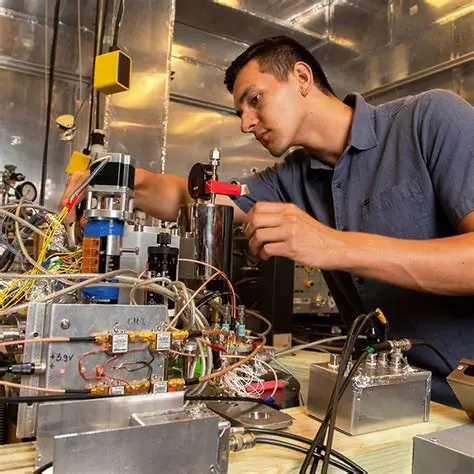The Department of Electrical and Computer Engineering at the University of New Mexico (UNM) is a renowned center of academic excellence, research innovation, and technological advancements. With a rich history spanning over 80 years, the department ranks among the top engineering programs in the nation, consistently attracting talented students, faculty, and industry partners.

Faculty and Research
UNM’s faculty is a diverse group of world-leading experts in various fields of electrical engineering, including:
- Power systems and renewable energy
- Communications and signal processing
- Control systems and robotics
- Microelectronics and photonics
- Artificial intelligence and machine learning
The department’s research enterprise is highly interdisciplinary, fostering collaboration with other departments within UNM and external institutions. Researchers at UNM are actively engaged in cutting-edge projects that address real-world challenges, such as developing sustainable energy solutions, enhancing wireless communications, and advancing autonomous vehicle technology.
Undergraduate Program
The undergraduate program in Electrical Engineering at UNM provides a comprehensive foundation in the discipline. Students gain a thorough understanding of core concepts, including:
- Circuit theory
- Electronics
- Electromagnetics
- Control systems
- Computer programming
In addition to foundational knowledge, the program emphasizes hands-on experience through laboratory classes and capstone design projects. Students work on real-world engineering problems, developing problem-solving skills, design capabilities, and teamwork abilities.
Graduate Program
The graduate program in Electrical Engineering offers advanced coursework and research opportunities. Students can pursue Master of Science (M.S.) or Doctor of Philosophy (Ph.D.) degrees in various specializations, including:
- Power engineering
- Communications and signal processing
- Control systems
- Microelectronics
- Nanotechnology
The graduate program prepares students for successful careers in academia, industry, and government research laboratories.
State-of-the-Art Facilities
UNM provides electrical engineering students with access to state-of-the-art facilities. The department houses a modern engineering building featuring:
- Advanced laboratories for circuit design, electronics fabrication, and testing
- A microelectronics research cleanroom
- A power systems research laboratory
- A robotics and automation laboratory
- A communications and signal processing laboratory
These facilities support cutting-edge research and provide students with hands-on experience using industry-standard equipment.
Industry Partnerships
UNM Electrical Engineering maintains strong partnerships with industry leaders, including:
- Sandia National Laboratories
- Intel
- Lockheed Martin
- Raytheon
- Toyota
These partnerships facilitate real-world research collaborations, internship opportunities, and professional development experiences for students.
Why UNM Electrical Engineering Matters
- National Recognition: UNM’s Electrical and Computer Engineering Department is consistently ranked among the top programs in the country by U.S. News & World Report.
- High Research Impact: Faculty members at UNM have published over 2,000 peer-reviewed papers in renowned journals and conference proceedings over the past decade.
- Innovation and Entrepreneurship: UNM students and faculty collaborate on innovative projects through the university’s Innovation Academy and Lobo Rainforest incubator.
- Career Success: Graduates of UNM’s Electrical Engineering program are highly sought after by top employers in the technology industry.
Common Mistakes to Avoid
- Not engaging with faculty: Students should seek out opportunities to interact with faculty outside of class, ask questions, and build relationships.
- Ignoring core coursework: While elective courses may be interesting, prioritizing core subjects is essential for building a solid foundation in electrical engineering.
- Neglecting hands-on experience: Hands-on projects and laboratory classes provide invaluable practical knowledge. Students should actively participate in these activities.
- Waiting until the last minute: Engineering assignments and projects require time and effort. Procrastination can lead to stress and diminished performance.
- Being afraid to ask for help: If students encounter difficulties, they should not hesitate to seek assistance from their professors, teaching assistants, or classmates.
FAQs
- What is the average starting salary for electrical engineers from UNM? According to the Bureau of Labor Statistics, the median annual salary for electrical engineers in the United States is $110,140 as of May 2021.
- What are the job prospects for electrical engineers? The job outlook for electrical engineers is projected to grow by 7% from 2020 to 2030, faster than the average for all occupations (4%).
- Can I get involved in research as an undergraduate? Yes, UNM encourages undergraduate students to engage in research through the Undergraduate Research Opportunities Program (UROP).
- What are the requirements for admission to the graduate program? Admission to the graduate program typically requires a bachelor’s degree in electrical engineering or a related field, with a minimum GPA of 3.0.
- What kind of financial aid is available for electrical engineering students? UNM offers a variety of financial aid options, including scholarships, grants, and teaching assistantships.
- How do I design electronic circuits? Designing electronic circuits is a complex process that requires knowledge of circuit theory, electronics, and software tools. Students can take courses, read textbooks, and participate in hands-on projects to develop these skills.
